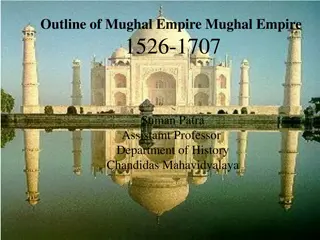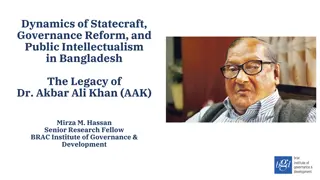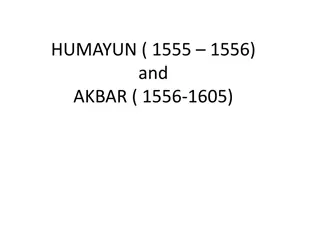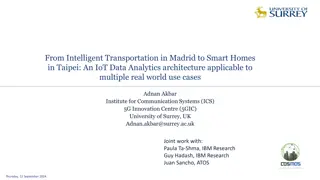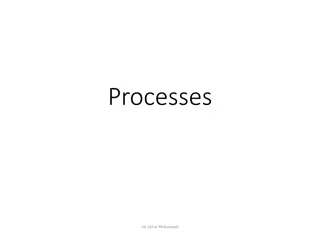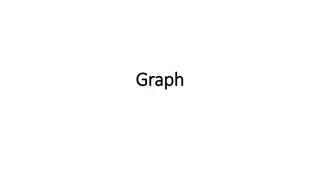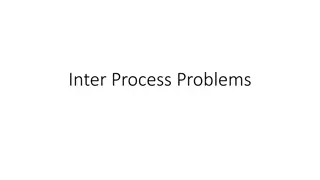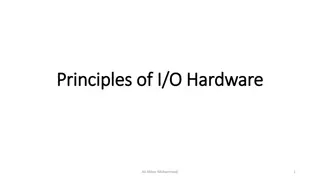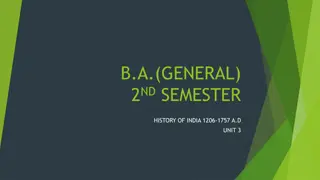AKBAR THE GREAT
After the death of Humayun, his young son Akbar assumed the Mughal throne with the guidance of Bairam Khan. Facing political unrest and enemies, Akbar's rule saw significant accomplishments, such as defeating Hemu at the Second Battle of Panipat and establishing a strong administrative system. His e
2 views • 31 slides
Outline of Mughal Empire Mughal Empire 1526-1707.
The Mughal Empire in India from 1526 to 1707 was a significant period marked by notable rulers such as Babur, Humayun, Akbar, Jehangir, Shah Jehan, and Aurangzeb. These emperors each contributed differently to the empire's development, with highlights including military conquests, administrative ref
7 views • 14 slides
Dynamics of Statecraft and Public Intellectualism: The AAK Legacy
Dr. Akbar Ali Khan, a notable figure in Bangladesh, made significant contributions to statecraft, governance reform, and public intellectualism. His oeuvre encompassed topics such as economics, politics, society, rule of law, bureaucracy, and more. AAK's role as a public intellectual involved contex
0 views • 15 slides
Evolution of Akbar's Religious Policy: A Historical Overview
In the 16th century, Akbar the Great implemented a revolutionary religious policy in the Mughal Empire. Initially a devout Sunni Muslim, Akbar evolved his stance to promote harmony and equality among all religions, fostering tolerance and understanding. This shift marked a significant departure from
1 views • 25 slides
Rajput and Religious Policy of Mughal Emperors: Akbar vs. Aurangzeb
Akbar, the first Mughal emperor, pursued a diplomatic policy towards the Rajputs, aiming to bring them under his suzerainty while maintaining friendly relations. His successor, Aurangzeb, adopted a more aggressive approach, seeking to annex Rajput kingdoms due to religious differences. This shift in
0 views • 6 slides
The Mughal Emperors Humayun and Akbar: A Legacy of Conquest and Diplomacy
Humayun, though not a skilled general, was kind and learned, while Akbar, one of the greatest monarchs of India, expanded the Mughal Empire through military conquests and strategic alliances with the Rajputs. Akbar's policy of religious tolerance and Rajput integration left a lasting impact on the M
0 views • 21 slides
Understanding Scheduling Algorithms in Operating Systems
Exploring the world of scheduling in operating systems, this content covers various aspects such as introduction to scheduling, process behavior, bursts of CPU usage, CPU-bound and I/O-bound processes, when to schedule processes, and the differences between non-preemptive and preemptive scheduling a
0 views • 34 slides
Understanding Trees in Data Structures
Explore the world of trees in data structures through a comprehensive discussion on tree definitions, properties, formal definitions, node relationships, and edges. Discover how trees are structured hierarchically with parent-child relationships, nodes, roots, siblings, leaves, ancestors, descendant
0 views • 47 slides
IoT Data Analytics Architecture for Real-World Use Cases
Explore the IoT data analytics architecture proposed by Adnan Akbar from the University of Surrey, applicable to diverse real-world scenarios like smart homes in Taipei. Discover how IoT leverages the connection of everyday objects to the internet, enabling remote control of physical environments. D
0 views • 22 slides
Understanding Processes and Process Management Theory by Ali Akbar Mohammadi
Delve into the intriguing world of processes, process scheduling, and process control in operating systems through the detailed insights provided by Ali Akbar Mohammadi. Explore key concepts such as process states, process control blocks, CPU switching, and context switching to enhance your understa
0 views • 33 slides
Stories of Historical Figures and Moral Lessons
Explore tales of historical figures like Taimur, Socrates, King Lear, Robert Bruce, and Jalaluddin Mohammad Akbar intertwined with moral lessons of perseverance, wisdom, and kindness. Each story reflects unique challenges and triumphs, offering insights into human nature and the essence of leadershi
0 views • 27 slides
Understanding Graph Data Structures and Algorithms by Ali Akbar Mohammadi
This content delves into the foundational concepts of graph data structures, covering topics such as graph traversal, transitive closure, minimum spanning trees, and more. Ali Akbar Mohammadi provides insight into the world of graphs, emphasizing the importance of vertices, edges, and the relationsh
0 views • 19 slides
Understanding Classical Inter-Process Communication Problems
Classical Inter-Process Communication (IPC) problems such as the Dining Philosophers Problem and the Readers and Writers Problem are explored in-depth by Ali Akbar Mohammadi. The challenges, solutions, and non-solutions to these problems are discussed, shedding light on issues like starvation in con
0 views • 15 slides
Principles of I/O Hardware Overview by Ali Akbar Mohammadi
This collection of images and text outlines the fundamental principles of Input/Output (I/O) hardware, covering topics such as block and character devices, device drivers, data rates, device controllers, CPU connectivity, I/O channels, and the concept of checksums. Ali Akbar Mohammadi provides insig
0 views • 17 slides
Overview of the Mughal Empire and Its Great Mughals
The Mughal Empire was a significant imperial power in the Indian subcontinent from 1526 to 1757, ruled by Muslim descendants of Genghis Khan. The empire extended over a vast region and produced six great Mughal rulers: Babur, Humayun, Akbar, Jahangir, Shah Jahan, and Aurangzeb. Babur was the founder
0 views • 14 slides
Exploring Shat Gambuj Mosque: Learning Journey
Join Assistant Teacher Hasan Ali from Akbar Ali Shah High School in Pakerhat, Khansama, Dinajpur, on an educational exploration of Shat Gambuj Mosque. Discover the history, natural beauty, and learning outcomes associated with this architectural marvel. Engage in activities like reading passages, pr
0 views • 20 slides
Akbar's Consolidation of Mughal Rule and Administrative Reforms in India (1206-1757)
Akbar, following Humayun's death, defeated Hemu and established Mughal rule. His reign marked significant administrative and revenue reforms, including Hindu participation and religious tolerance. Akbar's policies led to the expansion and consolidation of the Mughal Empire across northern and centra
0 views • 5 slides

